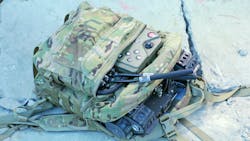QinetiQ chooses ad-hoc networking from Persistent Systems for Army Common Robotic System-Individual UGVs
By Mil & Aero staff
WALTHAM, Mass. – Unmanned ground vehicle (UGV) experts at QinetiQ North America in Waltham, Mass., needed mobile ad-hoc networking capability for the company's involvement in the U.S. Army Common Robotic System-Individual program. They found their solution from Persistent Systems LLC in New York.
QinetiQ is leading the Army's team developing the Common Robotic System-Individual -- better-known as CRS(I), which is a backpackable robot that weighs less than 25 pounds.
The CRS(I) UGV has an onboard sensor suite that enables infantry warfighters to detect threats and improve their situational awareness on the battlefield.
For QinetiQ, Persistent Systems will provide the company's Wave Relay mobile ad-hoc networking technology to link the CRS(I) UGVs in quickly configured tactical networks to enable warfighters to share voice and data, including imagery, video, and text.
In March, QinetiQ won a $164 million CRS(I) contract, and the company already has begun placing low rate initial production orders for Persistent's Wave Relay-Enabling Embedded module, which will be fitted into each new ground robot.
QinetiQ was one of the first members of the Wave Relay Ecosystem, an industry alliance of unmanned system and sensor companies putting their platforms on common Wave Relay ad-hoc networking to give the warfighter easy access to every unmanned vehicle, sensor, and camera.
The Persistent Systems Embedded Module form-factor is QinetiQ's MANET radio of choice for CRS(I), providing secure, long-range data communication for the small ground robots.
For more information contact Persistent Systems online at www.persistentsystems.com, or QinetiQ North America at https://qinetiq-na.com.

